Historical fiction for middle grade and young adults
Sandy Bay, Massachusetts was the site of one of the wildest invasions in U.S. history, when the might of the British Empire came up against hard-headed New England townsfolk. Based on eye-witness accounts of actual events, this book recounts—through the eyes of twelve-year-old Lemuel Brooks—of what happened on the night when the British put too much gunpowder in one of their cannons.
- Chosen as one of ALAN’s PICKS (American Library Association)
- Nominated for the New York State Reading Association’s 2010 CHARLOTTE AWARD
- Listed on the prestigious Boston Authors’ Club List of Highly Recommended Books
- Selected for the Pennsylvania School Librarians’ Association’s List of Best Books
- Used in many classrooms as an educational tool and a way to excite students about history. See Teacher’s Guide
Reviews
“Sanchez has taken a small piece of history from the War of 1812 and created a great tale of adventure and heroism.”
–ALAN’s picks September 2008 (American Library Association)
“A lively third-person account of a little-known event, with believable dialogue and plenty of detail about daily life that should be welcomed by readers of the genre.”
–Kirkus
“Readers need no background in the War of 1812 to recognize the threat presented by a large warship approaching a small town or to understand the fears and hopes that drive Lemuel’s choices, both good and bad. Clearly Sanchez has researched the period well, but the history never overwhelms the narrative. Instead, details of daily life make the story more believable. In a very readable nine-page afterword, Sanchez separates truth from fiction and discusses the novel’s historical background as well as her research. A source bibliography is appended. History buffs will enjoy reading a war story that is so well grounded in actual events.”
An Interview with the Author:
How did you become interested in writing for children? What advice would you give to aspiring authors?
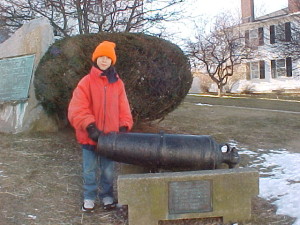
The cannon that the British fired at Sandy Bay was captured by the townsfolk and is still displayed on the lawn of the “Old Sloop” church.
Actually, I never planned to write especially for children, I just write. But I like to use words that are short but strong and say exactly what I mean. And I like to get to the point without beating around the bush, so I tend to write short. And so I guess I’m a children’s writer, but I didn’t plan on it.
For advice to aspiring authors, I would quote Winston Churchill, who also got right to the point. He said “Never give in. Never, never, never, never.” I started work on Sandy Bay in 1999, so it took nine years of revisions, rewrites and rejections to finally see it in print.
Tell me about this book. How did you come up with this idea?
When I was a little girl, we lived on Cape Ann, a chunk of granite on the Massachusetts seacoast. In this little town there was a church—a beautiful old New England-y church—with a cannonball lodged in the steeple. People said it was from when the British fired a cannon at the town in a war, long ago, but no one knew anything more about it. When I grew up I just had to find out more about that mystery, and that story turned out to be The Invasion of Sandy Bay.
Do you have any favorite authors or books?
So many! But my all-time favorite is a British author named Mary Renault. She took ancient Greek myths, like Theseus and the Minotaur, and searched for what really might have happened to create the myth. Was Theseus a mythical hero who fought a giant, or a real person with fears and problems like us–even though he happened to live four thousand years ago? Her book The King Must Die shows the magic of time-travel that is good historical fiction.
What inspires you in your writing?
I love to read about people who write, fictional or nonfictional. Like in Little Women where Jo goes up to the attic and writes these crazy imaginative stories, then locks her scribbled pages up in a tin box and has a game of tag with Scrabbble, her pet rat. When I get stuck, I read about someone else writing, and that gets me going again.
What question have you always wanted to be asked in an interview? How would you answer it?
People often ask, “What’s the book about?” And I tell them it’s a true story of a long-forgotten incident in history when the British invaded this little town and the Redcoats came face to face with the New England fishermen—and enemies found themselves working together instead of fighting each other.
But no one ever asks: “What’s the book really all about?” It’s about the fact that the real enemy is not always who you think it is. And that friends can be found when you least expect it.
Questions from readers, and the background to Sandy Bay’s true story: http://charlotteaward.wordpress.com/2009/06/22/anita-sanchez-interview
An excerpt from the book:
“Did you ever hear of the Cape Ann Sea serpent?” Lemuel asked uneasily. “My father used to say that…”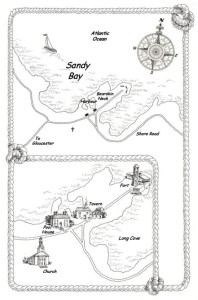
“Stow your gab!” Bill ordered. Lemuel shot the old fisherman a resentful glance as he lowered the hook for what seemed to be miles, till Bill finally grunted. Silence fell, broken only by the murmur of the breakers on Bearskin Neck, and a faint hiss as Bill sucked on his pipe, making the embers glow.
The boat rocked in a monotonous rhythm, and Lemuel sat trying not to think about his cold wet feet, while Bill pulled in fish after fish. Soon a there was a twitching pile of cod around their ankles, moonlight glinting on the bronze and silver scales.
Bill scratched the white stubble on his chin, and stared at the empty horizon with pursed lips, as though deciding which fork to take in a well-traveled road. Tendrils of fog were beginning to rise from the black water like steam from a boiling pot.
“Time to go back in?” Lemuel inquired hopefully.
Bill snorted. “We’ll try out by Halibut Point,” he announced. “It’s not more than a couple of miles.”
“A couple of miles?” Lemuel wailed.
“Don’t worry, we’ll find the way home.” Bill’s pipe wagged under his swooping white mustache as he talked. “Can’t miss on a night like this. Wait till the wind’s howling like a dog, and the stars are gone. Someday they’ll build a lighthouse on the Neck, instead of a fort.” The oarlocks groaned as he began to row.
“Mr. Pool was saying they’ll never build a lighthouse,” Lemuel said, reeling in his empty hook. “Taxes so high already, with the war and all…”
“The war—damned politician’s war.” Bill spat over the side of the boat. “Cod down to two dollars a quintal, by God, two dollars for three thousand fish. Why, it used to be twice that!” He gave a vicious yank on the oars.
Clouds were reaching up from the land to erase moon and stars. The shore lights faded in the mist. “Isn’t this far enough?” asked Lemuel, but Bill shook his head and kept rowing, his head thrust forward on the end of his long, wrinkled neck like a tortoise. Finally Lemuel spoke again. “How much…”
“This is the spot,” Bill interrupted, and Lemuel ground his teeth. Everyone interrupted him: his mother, the other boys, the hired man on the farm—and it looked like life in Sandy Bay wasn’t going to be any different. No one was ever interested in what he had to say.
“Bit of a fog coming tonight, but it’ll clear by morning,” Bill observed, cocking his head at the sky. Heavy clouds sagged low.
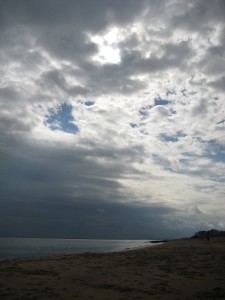 “Looks like rain to me,” Lemuel retorted.
“Looks like rain to me,” Lemuel retorted.
“It fair beats me how a lad as old as you don’t know the first thing about the weather,” Bill said “Don’t farmers know when it’s going to rain?”
Lemuel heaved a sigh that came right up from his toes. He had lived on a small farm, ten miles inland, until only last month, but now it seemed as though he could hardly remember a time when “farmer” wasn’t an insult.
Bill re-baited his line. “This cursed war that the idiots in Washington have wished on us,” he grumbled. “Why, we fought the British already, by God! I was one of the lads that marched off to Bunker Hill, thirty-nine years ago this spring…”
Lemuel leaned forward eagerly. A good yarn might take his mind off his wet feet, but Bill’s story meandered, pausing often to dwell on his bunions, and the shoes that wore out during the march. Lemuel’s mind began to wander, too, and he shivered. A cold breeze was rising. He wished now that he’d taken his mother’s advice about wearing his wool cap.
“Well, there’ll never be enough money for a lighthouse, Mr. Pool says.” Lemuel interrupted Bill, for a change. “And the town needed a fort. The war might go on for years.”
Bill snorted. “Ebenezer Pool’s a landlubber. Can’t talk sense into a landsman anyhow. What does he care about a lighthouse?” He glanced seawards, where the sky met the water in an unbroken sweep of black. “Not that it matters, boy. What the sea wants, she’ll take, you know. She’ll take it when she wants it.”
A faint, muffled creak drifted out of the quiet fog. Bill frowned, and leaned forward. The pipe embers glowed as he sucked in his breath. The creak came again, a small sound, like a door opening.
“What’s the matter?” Lemuel whispered. The sea serpent stirred again in his mind.
“I don’t know,” Bill said slowly. “Hush.” Again Lemuel heard it–a creak and then a groan. He sat up straight, and both of them peered into the night.
At first all Lemuel could see was the woolly blackness. Then part of the darkness took shape and moved across the water towards them. As it loomed closer, the outlines of sails and masts appeared, and the high sides of a deck. A ghostly ripple glowed white about her bow.
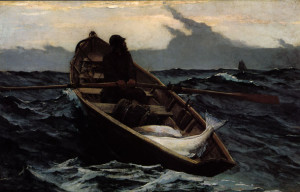
“It’ll run us down!” Lemuel cried. The wind hissed in the rigging as the approaching vessel slashed through the waves, headed directly for them, like a whale opening its jaws for a minnow. Bill gave a tremendous yank at the oars. Lemuel held his breath as the big ship neared, the pointed bowsprit stabbing overhead.
Then the high decks were gliding past like a shadowy cliff. A cannon mouth gaped wide, and then another; one by one a long row of ugly black guns passed, a yard away from his nose. Then waves surged backwards, and the dory wallowed like a drowning man.
“Bail, you fool!” shouted Bill, straining at the oars. Lemuel hastily grabbed a bucket and started tossing water over the side. The ship faded into the fog, silent as an owl.
If you go to Sandy Bay (now called Rockport, Massachusetts) look for the “Old Sloop” church. This is the church, still standing today, that was targeted by the British during the invasion. It was called the “old sloop” because the steeple was as tall as the mast of a sloop, a fast sailing vessel.
Many thanks to the family of John Chancellor for permission to reprint a detail from his magnificent painting Frigate Patrol for the cover of The Invasion of Sandy Bay. Here for more of his maritime paintings.

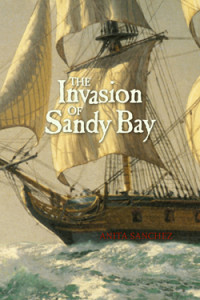





Recent Comments